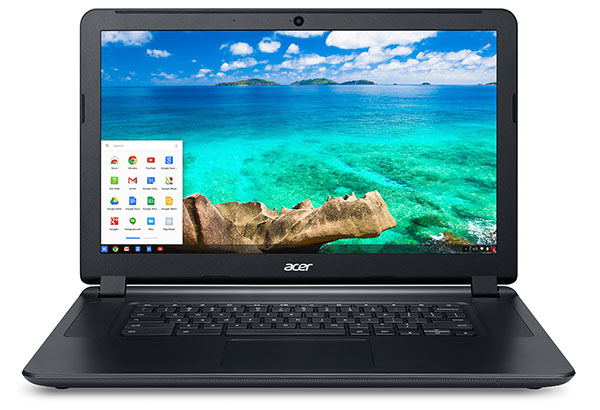Google is two years into a plan to consolidate the Chrome operating system — which it uses as the platform for a series of stripped down, low-cost computers — and the Android mobile OS, The Wall Street Journal reported Thursday.
Google officials quickly pushed back against the WSJ report, which claims that the company, now a subsidiary of the newly formed Alphabet conglomerate, plans to roll out a combined OS in 2017.
Chromebooks running the Chrome OS — Acer’s C910 is pictured above — have gained adoption as entry-level computers for students and as a low-cost option for a growing number of corporate customers.
Shortly after the WSJ report appeared, Hiroshi Lockheimer, senior vice president at Google, tweeted a response:
There’s a ton of momentum for Chromebooks and we are very committed to Chrome OS. I just bought two for my kids for schoolwork!
— Hiroshi Lockheimer (@lockheimer) October 30, 2015
“Chrome OS isn’t being killed,” a source familiar with the company’s strategy told TechWorldNews. “It has awesome momentum and we’re still pursuing Chromebook partnerships, for example, and doing better than ever in U.S. schools.”
Worldwide Chromebook shipments will reach 7.3 million units in 2015, Gartner predicted earlier this year. Educational institutions accounted for 72 percent of the market for the low-cost systems in 2014.
The Journal story comes just a month after Google announced plans for the Pixel C, a powerful 10.2 inch tablet that comes with a keyboard and is priced like a laptop. Although the company’s Pixel Chromebook team developed the device, it runs on the Android platform.

A Likely Story
Google previously has signaled plans to merge the two operating systems at some point, so the latest report may be an accurate reflection of the company’s long-term plans.
“The Chrome OS is not likely being abandoned, but probably more focused where it has been successful — like education,” said David Mitchell Smith, a vice president at Gartner.
However, “if they are going to have an integrated offering, it makes much more sense to add Chrome OS functionality to Android than vice versa,” he told TechNewsWorld.
On the other hand, with Google apparently making significant inroads with the low-cost Chromebook, any indications that the company intends to abandon the category could result in a major setback with potential customers.
“I think Google is pushing back because they’re getting some traction with Chromebooks and they don’t want to jeopardize that,” said Tom Mainelli, IDC program vice president for devices and displays.
The Chromebook has established a niche in the U.S. kindergarten through 12th grade market, Mainelli said, but there are more than a few companies looking at Chromeooks as an option as well.
“The major appeal is that they’re easy to deploy, manage and secure,” he told TechNewsWorld. “IT tends not to think of Android as particularly good at any of those three traits.”
A merger of the two operating systems would represent a major change for users of the systems, which is contrary to the needs and desires of the Chromebook customer base, Mainelli pointed out.
“They want a stable OS, not something that’s going to — potentially — dramatically change in the next 12-24 months,” he said.
Security Flaws
The concerns about the reported plan reflect the fact that from a security perspective, Android has a reputation as a more vulnerable operating system, observed Kevin Krewell, principal analyst at Tirias Research.
“The security issue is that Chrome operating system is a lightweight OS with the security of the Chrome browser. without the exploits possible with a full OS that supports apps,” he told TechNewsWorld. “While Google said it’s not killing Chrome OS, the merger of the teams will push the two OSes closer together. “The more code-sharing the two OSes use, the more likely a security hole gets into Chrome OS.”
The report of a full blown merger of the two operating systems overstates the facts on the ground, suggested Kevin O’Brien, chief executive at GreatHorn.
Various other operating systems also are vulnerable to attacks, he told TechNewsWorld.
What’s more likely, O’Brien said, is that “they are sharing more technology on a system level.”























































Having used a few Chromebook’s I can definitely say they lack a complete OS for many. But I also see plenty of positives when they are used for what they do best. Which is as a internet device. My Wife a teacher has Chromebook’s and they were mostly bought because of their low costs. They are not a everyday device for her. Actually her district has committed more to Windows of late then Chrome OS. I AM not inclined to say Chrome OS will benefit a lot from a Android/ Chrome OS hybrid OS. But certainly more apps will be available to the Chromebook device. It expands the ecosystem a bit but still lacks some general compatibility in a Windows world. Cheap appears to be its biggest advantage but many Windows PC’s are now competing as my Wife’s district has also purchased some HP Stream’s.